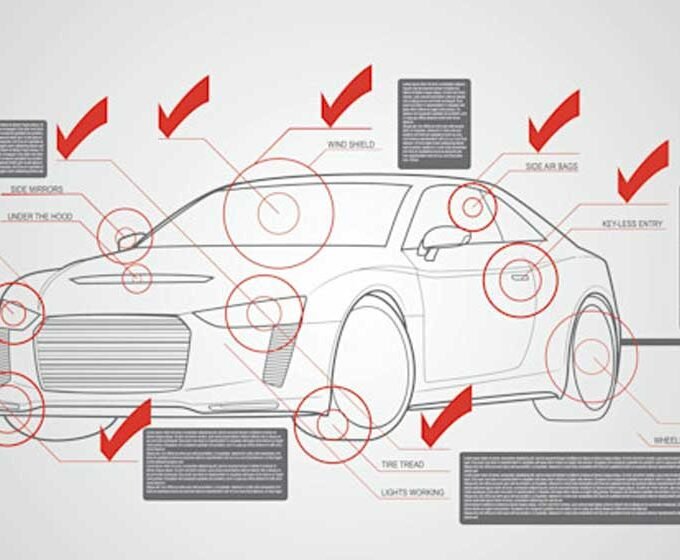As a responsible driver, it is crucial to understand the importance of crash reports and never overlook their significance. Crash reports are official documents that provide detailed information about an accident, including the parties involved, the circumstances leading to the collision, and the damage caused. These reports serve multiple purposes, ranging from insurance claims to legal proceedings and even vehicle repairs. In this article, we will explore five compelling reasons why drivers should always pay attention to crash reports and recognize their power in various aspects of the aftermath of an accident.
The Importance of Crash Reports for Insurance Claims
One of the primary reasons why crash reports should never be overlooked is their critical role in insurance claims. When filing a claim, insurance companies rely heavily on crash reports to determine the extent of liability and coverage. These reports provide objective and factual information about the accident, helping insurance adjusters assess the damages and allocate fault accurately. Without a crash report, the insurance claim process can become complicated, leading to delays and potential disputes. Therefore, obtaining a crash report promptly and ensuring its accuracy is essential to streamline the insurance claim process and maximize the chances of a fair settlement.
Furthermore, crash reports also act as crucial evidence in cases of hit-and-run accidents or when the responsible party denies involvement. In such situations, the crash report becomes instrumental in proving the occurrence of the accident and identifying the responsible party. This documentation can make a significant difference in ensuring that the victim receives the compensation they deserve.
How Crash Reports Help Determine Fault
Determining fault is a crucial aspect of any accident investigation, and crash reports play a vital role in this process. The information contained in a crash report, such as the positions of the vehicles, the sequence of events leading to the accident, and the presence of any witnesses, helps establish liability. Insurance companies and legal authorities rely heavily on this information to determine who is at fault, which directly impacts the outcome of insurance claims and legal proceedings.
Crash reports provide an unbiased and official account of the accident, often prepared by law enforcement officers who are trained to investigate and document accidents accurately. Their expertise ensures that the crash report is a reliable source of information when determining fault. By carefully reviewing the details mentioned in the report, drivers and their legal representatives can build a strong case to defend themselves or seek compensation, depending on their position in the accident.
The Role of Crash Reports in Legal Proceedings
In addition to insurance claims, crash reports also play a significant role in legal proceedings, especially when accidents result in injuries or fatalities. The information contained in a crash report serves as a foundation for legal cases, guiding attorneys and judges in understanding the circumstances surrounding the accident. The report helps establish negligence, contributing factors, and other critical details necessary to determine liability and award damages.
When presenting a case in court, crash reports can be used to support arguments, cross-examine witnesses, and challenge opposing parties’ claims. Attorneys rely on the information provided in the report to build a strong case, backed by reliable evidence. Therefore, drivers involved in accidents should never overlook the importance of crash reports, as they can significantly impact the outcome of legal proceedings and ensure a fair resolution.
The Benefits of Crash Reports for Vehicle Repairs
Apart from insurance claims and legal proceedings, crash reports also play a crucial role in facilitating vehicle repairs. When a vehicle is involved in an accident, the crash report provides valuable information to repair technicians and insurance adjusters. This information helps them assess the extent of damage, determine the necessary repairs, and estimate the cost involved.
By thoroughly examining the crash report, repair professionals can identify hidden damages that might not be immediately apparent. This ensures that all necessary repairs are addressed, preventing any long-term issues that may arise from overlooked damage. Moreover, the crash report also helps streamline the repair process by providing accurate information about the accident, allowing repair technicians to focus on the specific areas that require attention.
Understanding the importance of crash reports in vehicle repairs enables drivers to make informed decisions about repairs and ensures that their vehicles are restored to their pre-accident condition effectively.
Tips for Obtaining and Understanding Crash Reports
Now that we have established the significance of crash reports in various aspects of post-accident procedures, it is essential to understand how to obtain and interpret these reports effectively. Here are a few tips to help drivers navigate the process:
- Contact the relevant authorities: After an accident, it is crucial to contact the appropriate law enforcement agency to report the incident. They will be responsible for preparing the crash report, which can be obtained later for insurance claims and legal proceedings.
- Provide accurate and detailed information: When providing your account of the accident to the law enforcement officer, ensure that you provide accurate and detailed information. This includes the sequence of events, the positions of the vehicles involved, and any witnesses present. The more precise the information, the more reliable the crash report will be.
- Obtain a copy of the crash report: Once the crash report is prepared, make sure to obtain a copy for your records. This will be essential when filing insurance claims or seeking legal representation.
- Review the crash report carefully: When you receive the crash report, take the time to review it thoroughly. Pay attention to details such as the description of the accident, the assigned fault, and any additional notes made by the law enforcement officer. This will help you understand the report’s implications and prepare accordingly for insurance claims or legal proceedings.
By following these tips, drivers can ensure that they obtain accurate crash reports and understand their importance in the post-accident process.
Common Mistakes to Avoid When Handling Crash Reports
While understanding the importance of crash reports is crucial, it is equally essential to be aware of common mistakes that drivers should avoid when handling these reports. By avoiding these pitfalls, drivers can ensure that the crash reports are reliable and effectively serve their intended purposes. Here are some common mistakes to steer clear of:
- Failing to report the accident: It is essential to report any accident to the appropriate authorities promptly. Failing to do so can compromise the accuracy and validity of the crash report.
- Providing inaccurate information: When providing your account of the accident to the law enforcement officer, ensure that you provide accurate and truthful information. Any inaccuracies or false statements can undermine the credibility of the crash report and potentially lead to legal consequences.
- Not reviewing the crash report carefully: Upon receiving the crash report, take the time to review it thoroughly. Check for any errors or discrepancies and address them promptly. Ignoring or overlooking mistakes in the report can have detrimental effects on insurance claims or legal proceedings.
- Failing to seek legal advice: If you are involved in an accident that results in injuries or significant damages, seek legal advice promptly. An experienced attorney can guide you through the process, ensuring that you understand the implications of the crash report and how to navigate insurance claims and legal proceedings effectively.
By avoiding these common mistakes, drivers can ensure that crash reports serve their intended purposes accurately and reliably.
The Impact of Crash Reports on Insurance Premiums
Understanding the impact of crash reports on insurance premiums is crucial for drivers. Insurance companies consider crash reports when determining the risk associated with insuring a driver. If an individual has a history of accidents or frequent involvement in collisions, their insurance premiums are likely to increase significantly.
Crash reports provide insurance companies with valuable information about the driver’s past accidents, the severity of damages, and the assigned fault. Based on this information, insurance companies assess the risk involved in insuring a driver and adjust the premiums accordingly. Drivers with a clean driving record and no involvement in accidents are more likely to enjoy lower insurance premiums, as they are considered less risky to insure.
Therefore, drivers should never overlook the importance of crash reports, as they have a direct impact on their insurance premiums. By maintaining a safe driving record and minimizing accidents, drivers can ensure that their insurance premiums remain affordable.
The Future of Crash Reports and Technological Advancements
As technology continues to advance, so does the future of crash reports. Traditional paper-based crash reports are gradually being replaced by electronic reporting systems, improving efficiency and accessibility. Electronic crash reports enable a seamless exchange of information between law enforcement agencies, insurance companies, and other relevant parties, reducing delays and errors.
Furthermore, emerging technologies such as telematics and artificial intelligence are revolutionizing crash reporting. Telematics devices installed in vehicles can automatically detect accidents and transmit real-time crash data, making crash reports more accurate and timely. Artificial intelligence algorithms can analyze crash data to identify patterns and trends, enabling proactive measures to improve road safety.
The future of crash reports holds great potential for enhancing accident investigations, streamlining insurance claims, and promoting road safety. As drivers, it is essential to stay informed about these advancements and adapt to the evolving landscape of crash reporting.
Conclusion
In conclusion, crash reports are powerful tools that should never be overlooked by drivers. Their importance extends to various aspects of the aftermath of an accident, including insurance claims, legal proceedings, vehicle repairs, and insurance premiums. Understanding how to obtain and interpret crash reports accurately, while avoiding common mistakes, ensures their reliability and effectiveness.
As technology continues to evolve, the future of crash reports holds promising advancements that will enhance accident investigations and improve road safety. By recognizing the power of crash reports and staying informed about technological developments, drivers can navigate the post-accident process with confidence and maximize their chances of a fair resolution.
















